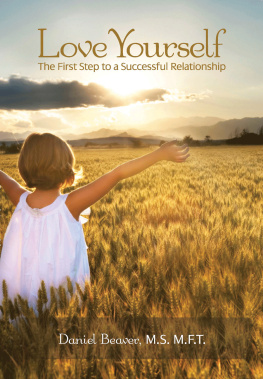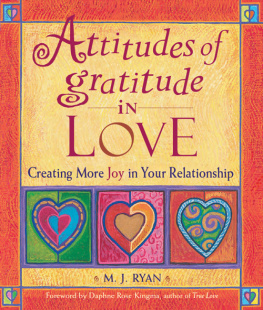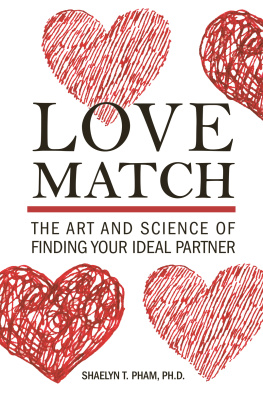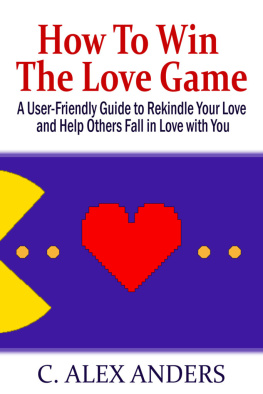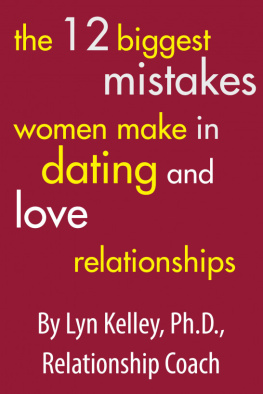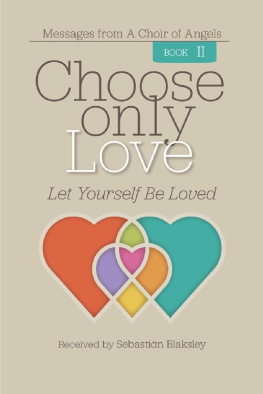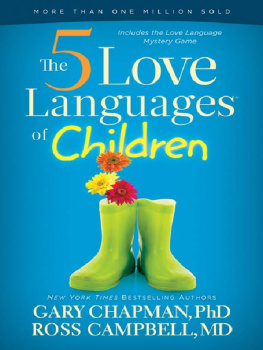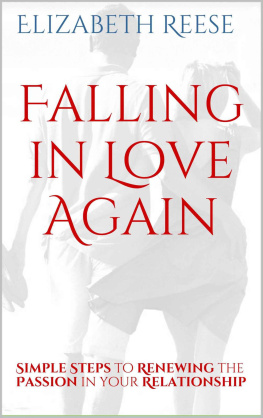Love Yourself
THE FIRST STEP TO A SUCCESSFUL RELATIONSHIP
Daniel Beaver, M.S. M.F.T.
Copyright 2013 University Readers, Inc. All rights reserved. No part of this publication may be reprinted, reproduced, transmitted, or utilized in any form or by any electronic, mechanical, or other means, now known or hereafter invented, including photocopying, microfilming, and recording, or in any information retrieval system without the written permission of University Readers, Inc.
First published in the United States of America in 2010 by Cognella, a division of University Readers, Inc.
Trademark Notice: Product or corporate names may be trademarks or registered trademarks, and are used only for identification and explanation without intent to infringe.
Printed in the United States of America
ISBN: 978-1-62131-203-1

Dedication
This book is dedicated to my loving and supportive wife, Nancy, who has given me the gift of what its like to be loved for who I am.
And to my two loving daughters, Danielle and Michelle. Please love yourselves; you both are wonderful women.
Introduction
L ove Yourself is my third published book dealing with the subject of intimacy. It completes my trilogy of books dealing with the subject of intimacy that has evolved over thirty-five years of being a therapist and college professor in the area of relationships and personal growth. In hindsight, its clear to me that loving yourself and having positive self-esteem is key to developing a healthy, long-lasting relationship. Loving yourself lays the fundamental psychological foundation on which a relationship can be built. Its hard to look at yourself first and do the work that it takes to love yourself. I hope in reading this book that you will find it easier to love yourself and find a clearer path to fulfillment.
It seems odd that people have to learn how to love themselves, but in this culture, its a challenge. Like all the areas of intimacy, whether emotional or sexual, we need information on how to accomplish the goal of self-love. There is nothing natural about self-love; it requires learning and unlearning attitudes and behaviors that undermine the goal of self-love.
As with my other two books, Creating the Intimate Connection and More Than Just Sex, I examine the rather vague concept of loving yourself and take the subject to a very pragmatic and down-to-earth level. I want the reader to apply the material in this book to their life and make some positive changes in the areas of self-love and self-esteem. I provide real-life examples so that you can learn from my experience and from all the patients and students who have shared their experiences with me. I was truly someone who didnt love myself and was able to make the transformation to self-love. I hope the material in this book will give you the tools to make the same personal changes.
Be prepared to give up what you think is right or wrong, and open yourself up to what works. In the psychological world of attitude and behavioral change, its about effecting changes in your life. Its not about arguing or debating how your life should be, but instead what works for you in achieving the goal of loving yourself. When a person moves out of their comfort zone, they are stepping into a whole new world, and there is a tendency to hang on to the old, even though its causing psychological difficulty. Taking the risk to love yourself may be scary and awkward at first, but after a while, your new attitudes and behaviors will become the norm, and I am sure that your life will be enriched.
Any names or cases used as examples in this book have been changed for reasons of confidentiality. Any similarity to real-life situations is coincidental.
Lastly, I want to give a special thanks to Rosemary Gretton for all her editorial support in the writing of this book.
Chapter One: The Cognitive Behavioral Approach
I am often asked whether a person can really change who they are after so many years of living. Can you really teach an old dog new tricks? Can you really learn to love yourself and develop positive self-esteem and self-confidence? The answer to all of these questions is yes. If an individual is motivated to change and is open to developing new attitudes and beliefs, then it is possible. Over the years of practicing psychotherapy, I have helped many of my patients and the students in my college and university classes bring about personal changes in their attitudes and behaviors.
The psychological approach I use in helping them make these changes is called cognitive-behavioral. I was introduced for the first time to this style of psychotherapy and teaching when I trained as a sex therapist. It was used as a treatment approach that had very good outcomes in a fairly short period. Eventually I began to use the cognitive behavioral approach in all my work with people. It didnt become a popular approach among therapists until managed mental health care took over the practice of psychotherapy in the United States. However, when health insurance companies saw that quick results could be achieved relatively quickly, they realized this approach was cost effective when compared to other styles of therapy.
A good understanding of this approach is a helpful starting point in the process of learning to love yourself. The word cognitive means the process of acquiring knowledge by use of reasoning, intuition, or perception. Cognitive refers to the attitudes, beliefs, and values that we have learned from our particular culture. These include both the overt and covert messages we receive from our families of origin, our educational experience, our religious training, our peer culture, and the all-encompassing media. We were taught how to think about how to be a man or a woman, wife or husband. We were taught what being successful meant or what being beautiful or sexy was all about. We were taught how to love ourselves or not. The majority of this teaching went on without our conscious knowledge, making it difficult to reject any of the beliefs. The messages that were overt and direct were delivered by authority figures, so we couldnt really question whether what they were saying made any sense. Its just the way it was. As a result, these messages were embedded into our everyday thinking, greatly influencing our personal lives, both positively and negatively.
The behavioral part of this approach relates to the actions we take in our everyday world--what we do in terms of interacting with other people in our business dealings or in our personal lives. Its the way we communicate with others and ourselves, the way we treat others and ourselves, and the way we make love. In this approach, most of our behavior stems from our cognitive thinking. Behavior is also learned from what we see in our families through the modeling process. It isnt so much what our parents said that we remember, but how they acted. These memories stick with us well into adult life. Similar to our cognitive beliefs, some of these behaviors are there without our knowing of their existence on a conscious level. They just come out of what seems like nowhere and suddenly we find ourselves acting like one of our parents. This could be a good thing, but it could also be a negative experience, depending on your point of view.
An example of this happened to me once when I was having dinner at a restaurant with my two daughters when they were teenagers. They ordered their food, and when it came, they didnt eat much. I got upset, and out of nowhere came the voice of my father, If you two ordered all this food, then you have to finish what is on your plate. After I realized what I had said, I told them not to worry about it and recanted my earlier statement by telling them to eat what they could, but if they were full they needed to stop and we would take the rest home in a doggie bag. I heard my fathers message about wasting food and money, but there was no concern about obesity. This is an example of how you can change a cognitive belief of the past and replace it with one of your own, which in turn changes your behavior.
Next page
